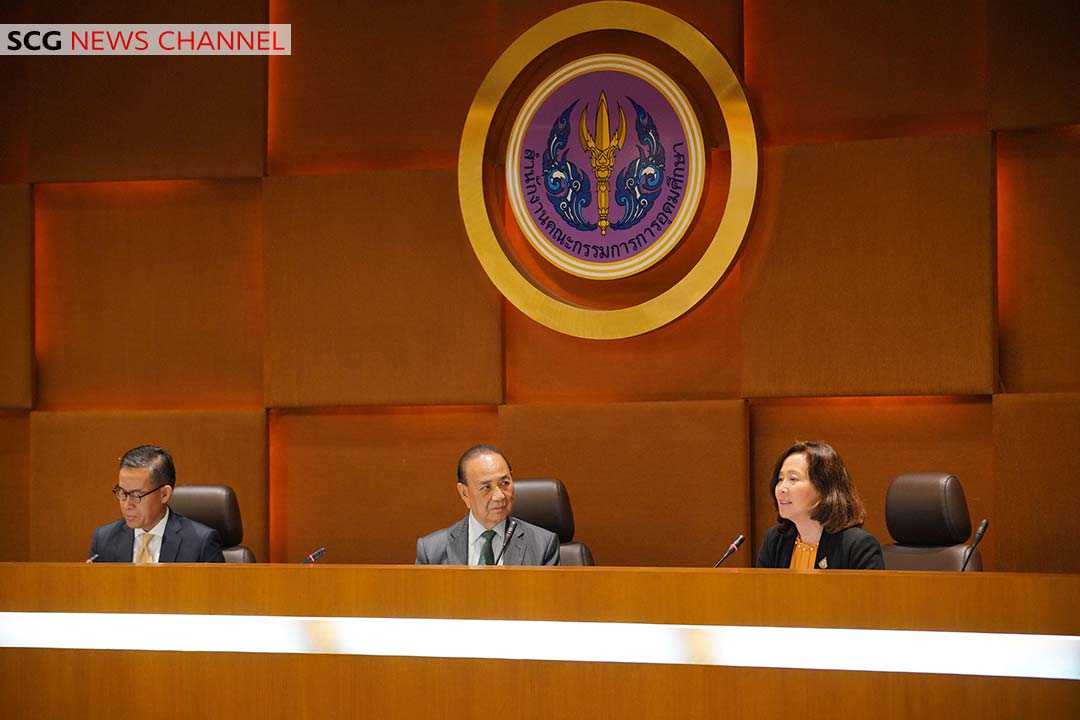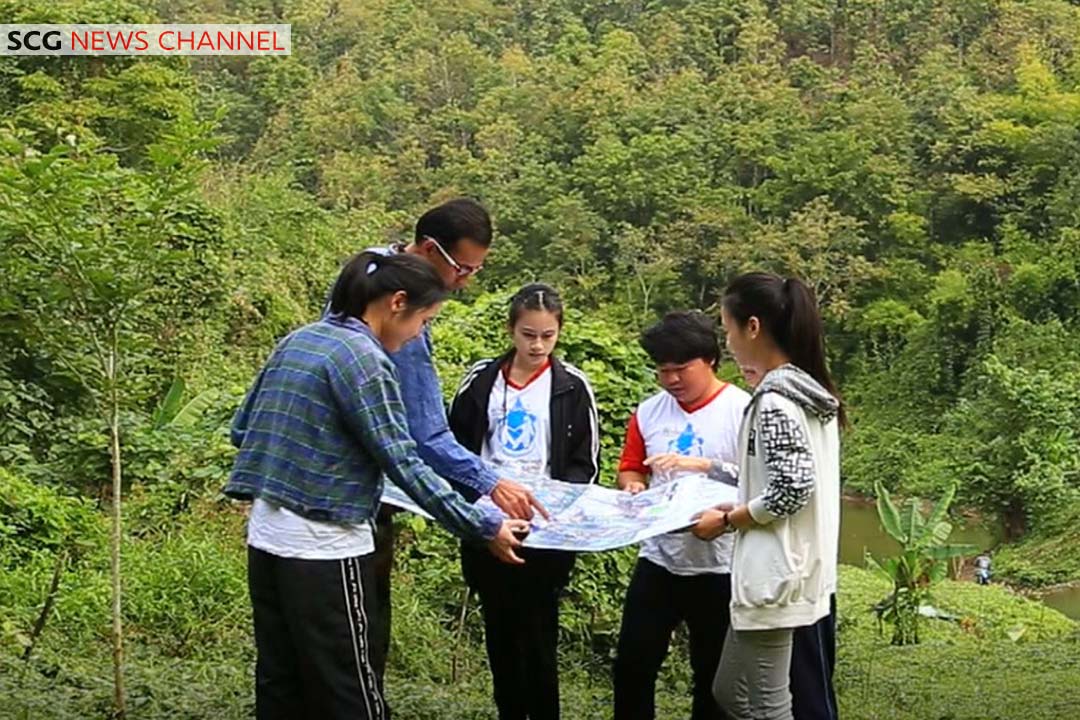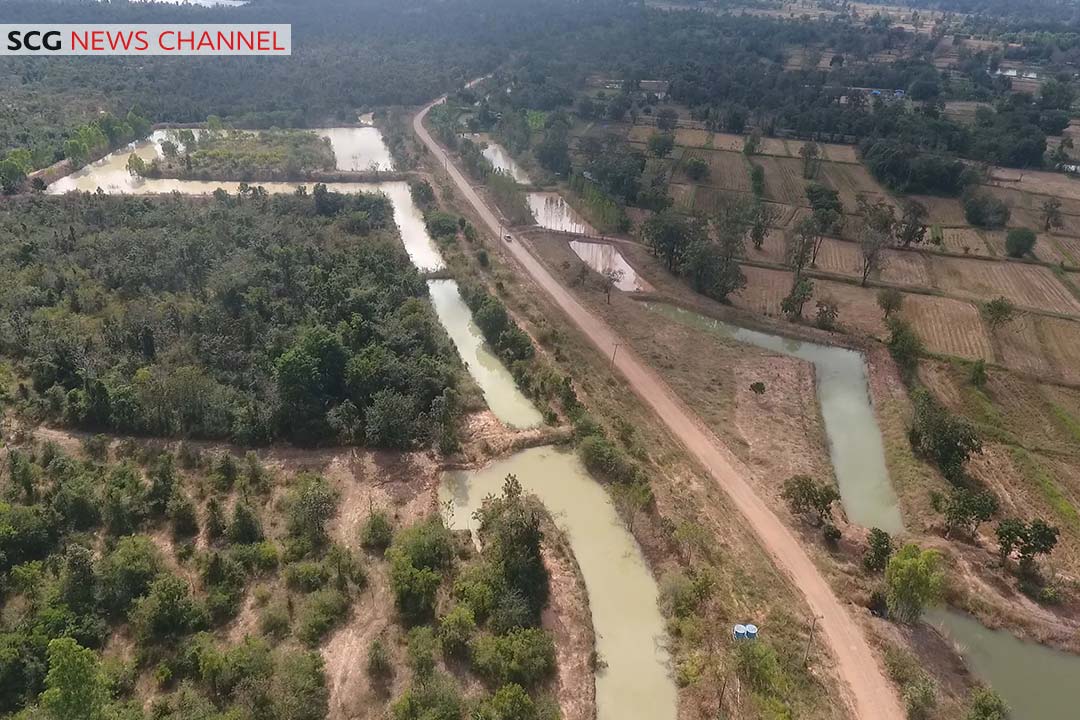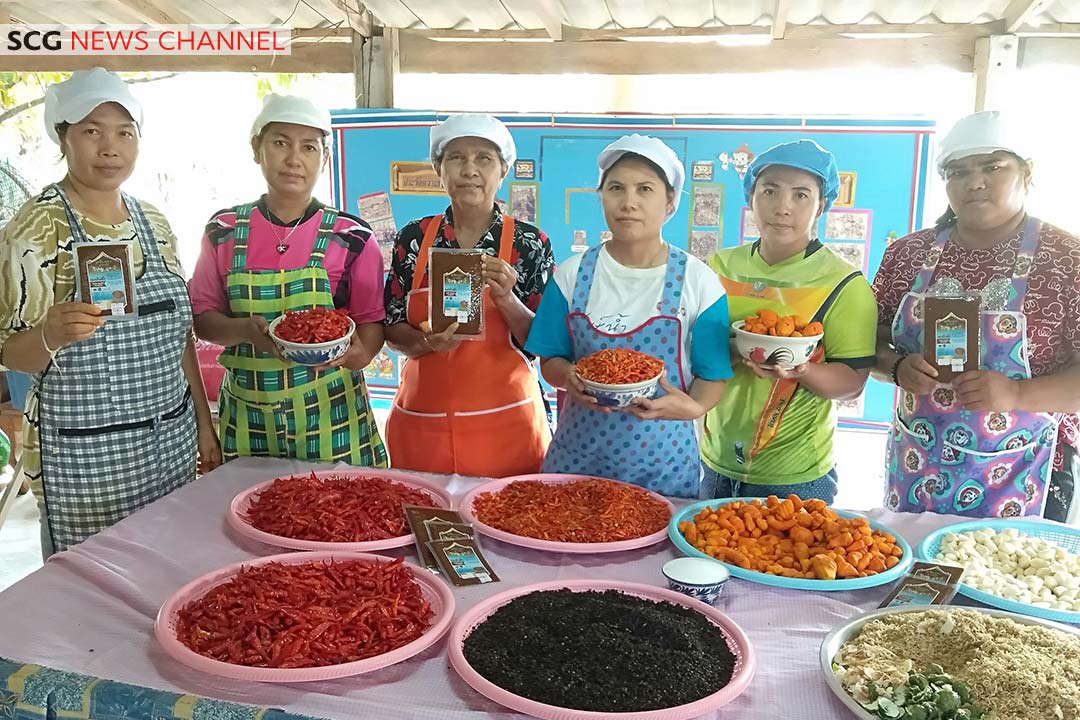Dr. Suvit Maesincee, Minister of Higher Education, Science, Research and Innovation (MHESI), together with Utokapat Foundation Under the Royal Patronage of HM the King, Hydro-Informatics Institute (Public Organization), SCG, Bualuang Foundation, and Bangkok Bank Public Company Limited, announced the success of the “Joining Hearts to Fight Drought” Project which received cooperation from both the public and private sector in addressing the drought issue by encouraging communities to independently fight drought in line with the royal initiatives on water management. The project resulted in communities surviving the drought in 2020 which saw the most severe drought in 40 years. The press conference was held at Prof. Prasert Na Nakhon Conference Room, 3rd Floor, Udom Suksa 1 Building, Office of the Permanent Secretary for Higher Education, Science, Research and Innovation on Si Ayutthaya Road.
Mr. Sumet Tantivejkul, Chairman of Utokapat Foundation Under the Royal Patronage of HM the King and Honorary Chairman of Hydro-Informatics Institute revealed that the current patterns of rain have changed from the past, increasing the risk of floods and droughts. This year, Thailand faced the most severe drought in several decades. Therefore, the public and private sector as well as individuals have joined hands to encourage communities to independently solve problems relating to drought in line with the royal initiatives on water management of His Majesty King Bhumibol Adulyadej. First of all, communities must understand the conditions of the land, the amount of water they have, and the amount of water they need, in order to adapt to their existing resources. Then, they need to be able to access knowledge regarding water management. For this stage, the team from Utokapat Foundation and HII has been seeking potential communities where they can guide on water management and assist them with technology to plan for water sources development while working with SCG, Bualuang Foundation, and Bangkok Bank to develop and revive water sources which will help communities sustainably address problems relating to drought by themselves.
“Today, many communities are able to serve as an example in water management in line with the royal initiatives as well as demonstrate the success from implementing the principles founded by His Majesty King Bhumibol Adulyadej. Due to this initiative, communities have become more independent and are able to seek knowledge in water management and implement projects by themselves. Thus, they were able to survive the drought crisis independently,” said Mr. Sumet.

Mrs. Venus Asavasitthithavorn, Director of Enterprise Brand Management Office, SCG, said, “SCG has implemented projects in line with the royal initiatives by constructing dams in abandoned forest areas around the cement factory in Lampang province since 2007 with the aim to revive the forest area and return balance to the ecology. Moreover, we engaged the community in the dam-building process and we also worked with Utokapat Foundation Under the Royal Patronage of HM the King as well as Hydro-Informatics Institute (Public Organization) to encourage the community to learn about sustainable water management.
Throughout the 13 years that SCG and its network have been working together on water management, we have seen tangible success as 100,000 dams will have been built by the end of this year. We changed the dry forest areas into green and abundant forests that can produce enough water for agricultural activities, which in turn can yield more crops and strengthen communities. Moreover, the communities have learned to generate further income from this initiative through activities such as offering homestay accommodations, establishing community enterprises, and selling products online. Therefore, the villagers do not need to leave their hometowns to work in cities in order to enjoy a better quality of life.
However, due to the severe drought crisis, SCG has expanded on this existing initiative to launch the “SCG Helps 108 Communities to Overcome the Drought Crisis” project to encourage 108 communities that are facing drought to independently solve this issue through the use of technology in order to seek and access water sources in the area. For this project, Utokapat Foundation and SCG are offering guidance to communities for a period of 2 years under a budget of 30 million baht. For the past three months since the project was initiated, the team has already helped 56 communities in provinces that are facing the drought crisis and enabled them to store water to be sufficiently distributed for consumption during this dry season.
“Since SCG initiated the water management project, we have helped 16,200 households in 70 communities across 28 provinces overcome the drought crisis and sustainably manage their water resources, with a total of 26.4 million cubic liters of water stored and 45,300 rai of agricultural land benefitting from the project. The reason for this success is due to the fact that people in the community employed knowledge together with morals as well as worked together to solve the crisis. They also demonstrated the integrity to fairly distribute the water among themselves and utilized knowledge and technology to combat the drought. Most importantly, the people in the communities have also shared their knowledge and experience in water management to other communities in order to inspire others in a larger circle,” said Mrs. Venus.

Mr. Asa Sarasin, Chairman of the Bualuang Foundation said that this is the first year that Bualuang Foundation and Bangkok Bank have joined this project through the “Bualuang Helps Communities Combat Drought” by working with 22 communities in 6 provinces in the north and northeastern regions: 9 communities in Khon Kaen province, 5 communities in Chiang Rai province, 2 communities in Chiang Mai province, 3 communities in Phrae province, 2 communities in Sukhothai province, and 1 community in Phitsanulok province. Most projects focused on enhancing the efficiency of water management through building or improving community water storage sources. On one hand, the project aimed for the community to connect to water sources and on the other hand, to establish a fair water distribution system to everyone in the community.
“Bualuang Foundation and Bangkok Bank are confident that the project to combat the drought crisis that we have taken part in organizing across 22 communities will not only solve the problem for the community in a sustainable manner, but will also provide an example for other communities to learn from their knowledge and experiences and follow in their footsteps in several areas in the country,” said Mr. Asa.
Dr. Taweelap Rittapirom, Vice President of Bangkok Bank Public Company Limited, said that Bangkok Bank has been supporting the projects carried out by Utokapat Foundation since 2007 in order to address the issues of drought and floods across the country.
The “Bualuang Helps Communities Combat Drought” project did not only enable communities in the project to address their problems in a tangible and sustainable manner, but it was also a good learning opportunity for the bank to work with communities which allowed the bank to understand their true needs and provide appropriate ways to support them.
“With this learning opportunity to work with the communities, we gained more experience and knowledge which can be passed on to other communities that face the same issues, thus, this project can be implemented in a larger circle,” said Dr. Taweelap.

Dr. Suvit Maesincee, Minister of Higher Education, Science, Research and Innovation (MHESI), said that the drought crisis is a national issue that the government is urgently addressing in 2020 by working with several agencies to ensure the highest efficiency in solving problems relating to water management. The success of the “Joining Hearts to Fight Drought” project is a good example of cooperation between the public and private sectors that also engaged the people in order to drive sustainable development with “communities and localities” as the main focus. The project also promoted security in line with the Sufficiency Economy Philosophy while demonstrating successful result in a concrete way through the cooperation of all sectors.
“The spread of the COVID-19 virus combined with the drought and economic problems is a complex crisis that Thailand is facing. I have assigned agencies in the MHESI to urgently provide assistance to the people in line with the mission of each agency. HII is the main agency responsible for water management, thus, I have assigned HII to carry out projects to promote water management which will enhance the security of the economy in communities across the northeastern region of the country. The projects included trainings to develop and upskill people in the communities so that they can generate more income in line with the royal initiatives using science and technology to manage water resources. HII had been continuously carrying out these projects with the public sector, the private sector, local areas, and communities in order to expand the water management project in the northeastern region to 400 communities by working with universities, the Second Army Area, and local organizations to solve problems relating to water resources in each area with the objective to encourage communities to be able to access water sources, and in turn, establish food security and sell excess crops to generate more income, leading to sustainable circular economy in the local level. Moreover, fresh university graduates can also make a living for themselves through these projects. These initiatives are examples of the success in implementing the Sufficiency Economy Philosophy and water management using science, technology, and innovation in order to enhance the potential of communities, resulting in more jobs and more income for local areas and communities both in the short- and long-term period, ” Dr. Suvit said.

In 2020, the “SCG Helps 108 Communities to Overcome the Drought Crisis” project and the “Bualuang Helps Communities Combat Drought” project assisted 78 communities in 27 provinces with 10,223 rai of agricultural land to gain an increased 10 million cubic meters of water: 1.22 million cubic meters for agriculture, 0.3 million cubic meters for drinking, and 8.57 million cubic meters for household uses. Moreover, the projects has helped a total of 42,414 people in 13,618 households.